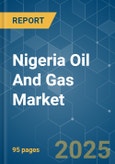Key Highlights
- Over the medium term, the abundant oil and gas reserves coupled with increasing foreign investment in the oil and gas sector in the country are expected to drive the market.
- On the other hand, vandalization and threats by militants on oil and gas infrastructures and increasing volatility in crude oil and gas prices are expected to hinder the market's growth during the forecasted period.
- Nevertheless, increasing developments in the country's downstream sector are expected to create significant opportunities for the market players during the forecasted period.
Nigeria Oil and Gas Market Trends
The Upstream Segment Expected to Witness Significant Growth
- The upstream sector focuses on exploring and producing oil and gas reserves. Many countries, including Nigeria, possess significant untapped hydrocarbon resources in their offshore and onshore areas. The availability of these resources presents ample opportunity for exploration and production activities, driving the growth of the upstream sector.
- Moreover, the upstream sector in the country generates substantial revenue for the government oil and gas sector generates substantial revenue for the country through taxes, royalties, and production share agreements. The economic benefits associated with the upstream operations make it an attractive investment sector.
- Furthermore, the upstream sector has witnessed significant technological advancements in recent years. Innovations in seismic imaging drilling techniques and reservoir modeling have improved the efficiency and success of exploration and production activities. These advancements have enabled the industry to access previously inaccessible reserves and enhance the production rate, further supporting the dominance of the upstream sector.
- According to Statistical Review of World Energy, 2022 crude oil production in Nigeria was 1.45 million barrels per day, which decreased 11% compared to 2021. One of the primary reasons for the decline is investors' slow final investment decisions (FIDs) in developing infrastructure. The government has identified the problem and has released policies to make investments in the country more attractive.
- For instance, in February 2022, the Nigerian Content Development and Monitoring Board (NCDMB) secured approval to launch a USD 50 million fund for NOGAPS Manufacturing Product Line. The fund would be provided to companies with manufacturing facilities in the Nigerian Oil and Gas Parks. NCDMB commissioned the ultra-modern valves assembling facility in Port Harcourt, Rivers State. Catobi Nigeria Enterprises Limited established this plant.
- Additionally, the demand for oil and gas has increased significantly in recent years due to the urbanization and development of infrastructural activities in developing countries. Due to the Russia-Ukraine conflict, the demand for oil gas through the African region increased significantly due to various organizations' restrictions on Russia.
- Therefore, as per the points mentioned above, the upstream sector will likely observe significant growth during the forecast period.
Growing Investments in Natural Gas Infrastructure are Expected to Drive the Market
- Nigeria possesses substantial natural gas reserves estimated to be one of the largest in Africa. Increasing investment in natural gas infrastructure enables the country to capitalize on these reserves and extract them for domestic and export purposes.
- Moreover, natural gas is considered a cleaner and more environmentally friendly source of energy compared to other fossil fuels. As the world moves towards reducing carbon emissions, there is a growing demand for natural gas as a transition fuel. Investments in natural gas infrastructure allow Nigeria to diversify its energy mix and meet both domestic and international demand for cleaner energy sources.
- Furthermore, the Nigerian government has implemented various initiatives to promote gas utilization for power generation, such as the Nigerian Gas Master Plan and the Gas Revolution Industrial Park. These initiatives aim to increase the share of natural gas in the country's energy mix and reduce dependence on other sources like diesel and fuel oil. Investments in natural gas infrastructure support these initiatives by expanding the capacity for gas supply to power plants.
- However, similar to oil gas, production in the country has decreased by almost 10.5%, according to the Energy Institute Statistical Review of World Energy. In 2022, Nigeria Produced 3.91 billion cubic feet of natural gas compared to 4.37 billion cubic feet in 2021. The decrease was due to the slow financial investment decisions by various investors across the world due to the Russia-Ukraine conflict.
- With the announcement of new gas infrastructure projects, the upstream sector, especially the gas segment, is expected to perform better during the forecast as the demand for gas is likely to increase with the infrastructure in the country.
- For instance, in June 2023, Totalenergies announced that they had discovered a gas field at the OML 102 offshore oil field in Nigeria. Totalenergies Nigeria operates OML 102 with 40% interest alongside state oil firm NPCC, which holds the remaining 60% of the interest in the field. The company expects to start production after the geological service comes back.
- In conclusion, the increasing investments in gas infrastructure in the country are expected to drive the market during the forecasted period.
Nigeria Oil and Gas Industry Overview
The Nigerian oil and gas market is semi-consolidated. Some of the major players operating in the market (in no particular order) include Nigerian National Petroleum Corporation (NNPC), Shell PLC, TotalEnergies SE, Chevron Corporation, and Exxon Mobil Corporation, among others.Additional Benefits:
- The market estimate (ME) sheet in Excel format
- 3 months of analyst support
This product will be delivered within 2 business days.
Table of Contents
Companies Mentioned (Partial List)
A selection of companies mentioned in this report includes, but is not limited to:
- Nigerian National Petroleum Corporation (NNPC)
- Shell PLC
- TotalEnergies SE
- Chevron Corporation
- Exxon Mobil Corporation








